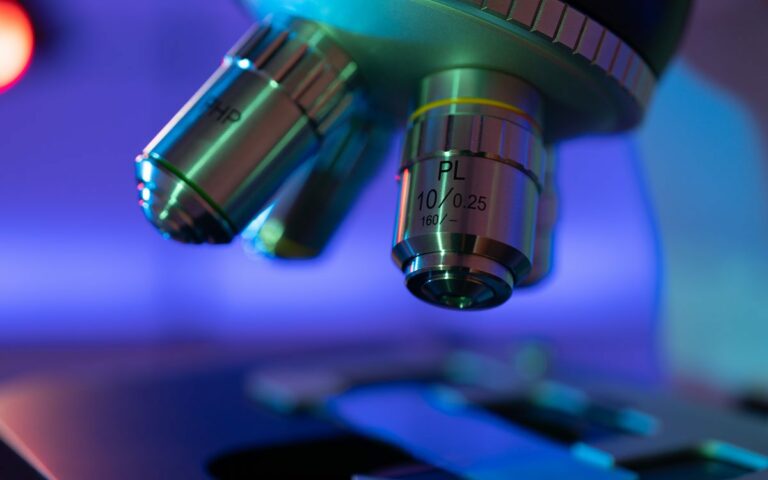Author: Mary Premenko-Lanier, SRI International

SRI scientist explores how to tame and leverage the human immune system to prevent allergies and fight disease
Four years ago, as I paced the halls of a Peruvian hospital and anxiously awaited updates about my 13-year-old son’s food allergy-related health crisis, my immunology training kicked in. I mentally traced the steps of the out-of-control immune response that had brought him to this point, and what needed to happen to bring his body back to normal.
We were lucky. My son survived. But for so many frantic parents, this situation ends in tragedy.
I have long believed that in order to create something that will have a real impact, you have to be deeply passionate about it. My 2016 experience on the Amazon River was a catalyst for me. In addition to my background in immunology, I have the good fortune to run a lab at SRI International, a national research organization, where I typically focus on virology and vaccine research with projects ranging from influenza to herpes simplex virus. I am grateful to work for an organization that gives its researchers great latitude in pursuing discoveries that will have real impact for improving and even saving lives.
Since that fateful trip to Peru, my team has deployed the tremendous resources and laboratory infrastructure we have at SRI to make incredible progress in our efforts to address dangerous food allergies. Today, we are actively developing a pre-exposure therapy that we believe could revolutionize how we treat food allergies. Our goal is to give people protection ahead of time by suppressing the immune response, and our early results are very promising.
The SRI capabilities in immunology and vaccine development go far beyond addressing severe food allergies. As a research scientist, I get to deploy my training in virology and vaccine design for numerous important programs. This includes COVID-19, the greatest global health crisis we face today.
Do I have to wipe down my mail?
I’m particularly excited about an extensive research program we’ve enacted to better understand SARS-CoV-2 transmission — particularly how easily people can get infected by touching objects that have viral particles on them. Inanimate objects that can transfer infectious pathogens to new hosts are known as fomites. If you’ve been wiping down your groceries, door handles or mail to keep yourself safe from COVID-19, you’ve been fighting fomite transmission.
Respiratory viruses such as measles have long been associated with fomite transmission, so it’s a clear priority in our understanding of how SARS-CoV-2 spreads. While early research gave us some rough guidelines about how long viral particles might survive on certain surfaces, my team has been engaged in a deep dive to model a wide range of objects, textures, and surface types. Our goal is to determine with more precision how much virus has to be present on a fomite for it to be infectious and how long the virus can remain viable on inanimate objects. This information will be critical for establishing better disinfection protocols for everything from handrails in hospital to your mail and groceries.
Right now, we’re in the process of repeating these experiments to ensure our results are accurate and reliable. We hope to publish our findings in early 2021.
COVID-19 therapies
Beyond fomite transmission, the SRI team has been heavily involved in research that will contribute to new therapies and vaccines for the pandemic. We are testing various SARS-CoV-2 antibodies to determine how well they find and attack the virus. Those that are particularly effective could be promising candidates for new monoclonal antibody treatments.
We also work closely with organizations developing antiviral small-molecule treatments for COVID-19. SRI International has sophisticated lab facilities with designations that allow us to study dangerous pathogens such as SARS-CoV-2 safely (BSL-3 and ABSL-3). Standard labs don’t have these biosafety ratings, so SRI is among a select group of organizations nationally that can serve as a dedicated partner to carry out the research needed for SARS-CoV-2. Our past experience working with other deadly coronaviruses — including SARS and MERS — allowed us to get up to speed quickly and bring our immunology, modeling, and formulation expertise to bear for the newest member of this viral family. Today, our research focuses heavily on repurposing existing drugs and testing novel antiviral compounds that may be effective in patients infected with SARS-CoV-2.
Our efforts to understand how the immune system protects against this virus will also be important in guiding better vaccine development. We are conducting a variety of studies to better define the pathology of this virus and how it’s transmitted, how it can lead the immune system to a dangerous overreaction, and how the disease progresses in patients.
The potential to improve human health by understanding and better harnessing the immune system is a big part of the reason I’ve been fascinated with the field of immunology. I’m thankful that — as a member of the SRI team — I have access to the facilities, expertise and support that enable me to explore it fully.



